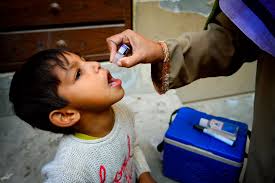Polio, a highly infectious and preventable disease, once struck fear across the world, leaving thousands of children paralysed or dead.
Today, thanks to decades of concerted global efforts, most nations have successfully eradicated the disease.
However, Pakistan remains an alarming outlier. In 2024, the country reported 68 polio cases, starkly contrasting with its neighbour Afghanistan, which recorded 25 cases during the same period.
These figures underscore Pakistan’s persistent struggle to protect its children from a scourge that modern medicine has rendered entirely avoidable.
Polio’s global decline and Pakistan’s missed opportunity
The story of polio eradication is one of the greatest triumphs in public health.
Spearheaded by the Global Polio Eradication Initiative (GPEI) in 1988, the world’s collective fight against polio has seen cases drop by over 99 percent.
By 2023, the World Health Organization (WHO) declared six of the seven WHO regions polio-free.
Yet, Pakistan, alongside Afghanistan, remains one of the last reservoirs of wild poliovirus transmission.
Pakistan’s failure to eliminate polio is particularly glaring given the availability of vaccines, robust global funding, and technical support.
While Afghanistan faces formidable challenges such as political instability and a fragile healthcare system, Pakistan, with a comparatively stronger infrastructure, should have had the upper hand in eradicating the disease.
Instead, the country’s polio numbers surged in 2024, raising urgent questions about governance, community engagement, and vaccine acceptance.
The root causes of Pakistan’s polio crisis
Misinformation and vaccine hesitancy: Pakistan’s polio campaigns have long been plagued by misinformation.
Conspiracy theories—often amplified by social media—claiming that polio vaccines cause infertility or are part of a Western agenda have led to widespread distrust.
Many parents refuse to vaccinate their children, fearing harmful side effects or doubting the intentions of health workers.
These myths have been particularly pervasive in rural and tribal areas, where literacy rates are low and traditional beliefs hold sway.
Targeted violence against health workers: One of the most tragic aspects of Pakistan’s polio struggle is the violence directed at healthcare workers.
Polio vaccinators, many of whom are women, often risk their lives to immunise children.
Since 2012, dozens of vaccinators and security personnel have been killed in militant attacks.
The assassination of health workers has not only disrupted immunisation campaigns but also created an atmosphere of fear and reluctance among those tasked with delivering vaccines.
Weak governance and coordination: Pakistan’s polio eradication efforts suffer from poor coordination between federal, provincial, and local governments. Inconsistent policies, funding gaps, and bureaucratic hurdles have hindered vaccination drives.
Additionally, health services in remote and conflict-affected areas remain inadequate, leaving many children unreached by immunisation drives.
Poverty and poor sanitation: Polio thrives in environments with poor sanitation, as the virus is primarily transmitted through contaminated water.
In Pakistan, widespread poverty and inadequate sanitation infrastructure exacerbate the problem.
Open defecation and unclean water supplies facilitate the virus’s spread, particularly in densely populated urban slums.
Afghanistan reported fewer cases
Afghanistan, despite its challenges, reported fewer polio cases in 2024 than Pakistan. This disparity highlights critical differences in approach and execution.
Afghanistan’s polio eradication efforts have prioritised building trust within local communities.
Religious leaders, tribal elders, and community influencers have been actively involved in dispelling myths about vaccination.
This approach has helped increase acceptance of the polio vaccine, even in conflict zones.
Afghanistan has implemented innovative strategies to reach children in inaccessible areas.
Mobile vaccination teams, cross-border coordination with Pakistan, and the use of technology to track vaccination coverage have contributed to their relative success.
The country’s polio programme has worked closely with local authorities to ensure the safety of health workers.
Although challenges remain, coordinated security measures have reduced the frequency of attacks on vaccinators compared to previous years.
Pakistan could benefit significantly by adopting similar strategies.
Strengthening community trust, investing in mobile healthcare units, and ensuring the safety of vaccinators are critical steps toward progress.
The human cost of inaction
Behind every polio case is a child whose life has been irrevocably altered.
Polio’s effects are devastating: lifelong paralysis, stigma, and dependence on others for basic needs.
For families, the financial and emotional burden of caring for a disabled child can be overwhelming, especially in impoverished communities.
The continued prevalence of polio in Pakistan also poses a threat beyond its borders.
As long as the virus exists in one country, it remains a risk to children worldwide.
International travel and migration could lead to the reintroduction of polio in polio-free regions, undoing decades of progress.
Pakistan’s battle against polio is far from lost. The country has the resources, international support, and technical expertise needed to eliminate the disease.
What it requires is unwavering political will, robust governance, and community involvement, according to experts.
Pakistan’s failure to eradicate polio is a tragic indictment of its public health system and governance.
The fact that a preventable disease continues to cripple its children in 2024 is a reminder of the dire consequences of inaction, misinformation, and poor coordination.
While the challenges are formidable, they are not insurmountable.
By learning from its neighbours, mobilising communities, and prioritising the safety of health workers, Pakistan can turn the tide against polio.
The world’s success in eradicating the disease in most regions proves that a polio-free future is within reach—but only if Pakistan acts decisively and urgently. The stakes are nothing less than the health and future of its children.
The post Polio’s lingering grip: Pakistan’s struggle against a preventable scourge appeared first on Newswire.





